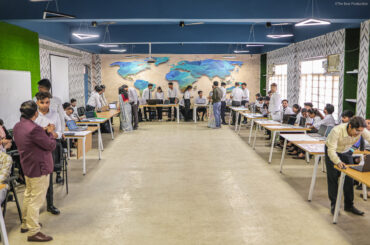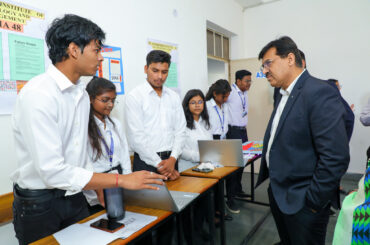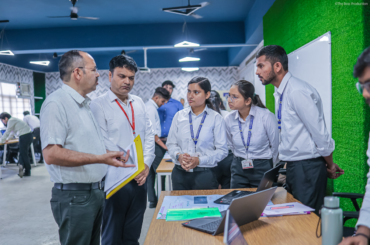CSE Full Form
The CSE full form, standing for Computer Science and Engineering, represents a dynamic and popular field that combines the principles of computer science with engineering methodologies.
This discipline focuses on the design, development, and implementation of software and hardware systems, providing a comprehensive understanding of computing technologies.
Students pursuing CSE gain expertise in computer programming, algorithms, data structures, computer architecture, and software development.
Additionally, the field encompasses emerging areas such as artificial intelligence, machine learning, cybersecurity, and data science, equipping graduates with the skills required to innovate and excel in the rapidly evolving tech industry.
Some of the most opted courses in India and St. Andrews college or different Engineering college or Management colleges are as follows:-
CSE Course Overview
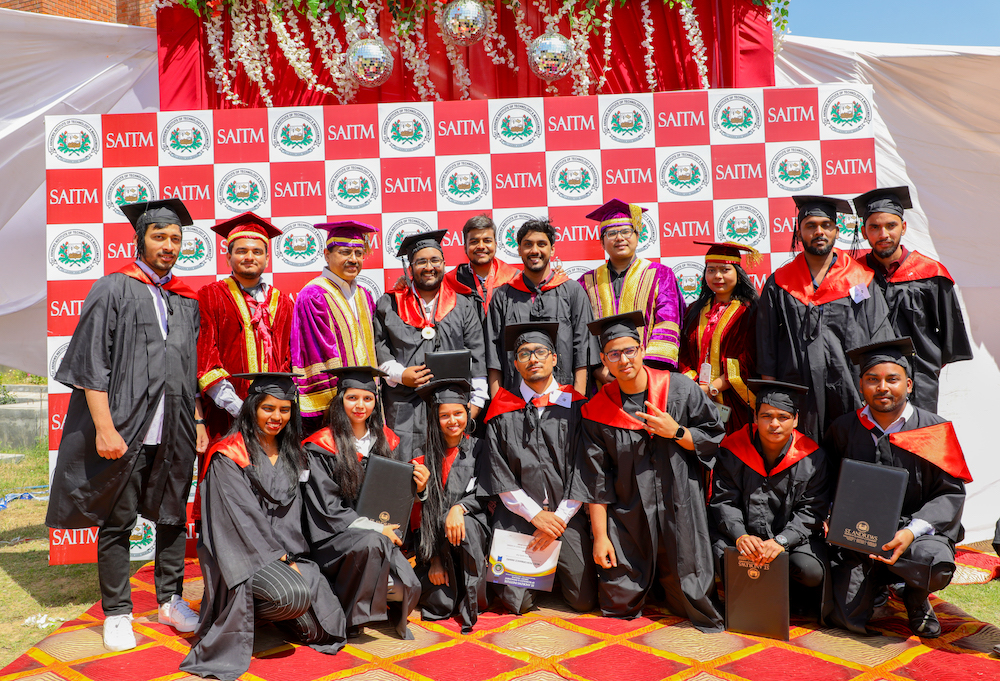
Computer Science and Engineering (CSE), a field that merges computer science with engineering principles, focuses on designing, developing, and implementing both software and hardware systems. Key subjects in this discipline encompass programming, data structures, algorithms, computer architecture, and software engineering, representing the CSE full form in its breadth and application.
Course Structure
A typical CSE course is structured to provide both theoretical knowledge and practical skills. Here’s an overview of the key components:
1. Core Subjects
Programming Languages: C, C++, Java, Python, etc.
Data Structures and Algorithms: Fundamental techniques for data organization and problem-solving.
Computer Architecture: Study of computer hardware and organization.
Operating Systems: Concepts of process management, memory management, and file systems.
Database Management Systems: Design and management of databases.
Software Engineering: Principles of software development, including methodologies and project management.
Theory of Computation: Formal languages, automata theory, and computational complexity.
Computer Networks: Networking principles, protocols, and internet technologies.
Artificial Intelligence and Machine Learning: Basics of AI, machine learning algorithms, and applications.
Web Technologies: Development of web applications and internet technologies.
2. Elective Subjects
Cyber Security: Principles of information security, cryptography, and network security.
Data Science: Big data analytics, data mining, and statistical analysis.
Cloud Computing: Concepts of cloud architecture, services, and deployment models.
Internet of Things (IoT): Design and development of IoT systems.
Blockchain Technology: Basics of blockchain, cryptocurrency, and distributed ledger technologies.
Practical Training
Laboratories: Practical sessions in programming, hardware, networks, and software development.
Projects: Real-world projects offer opportunities to apply theoretical knowledge and develop problem-solving skills.
Internships: Industrial training to gain hands-on experience and industry exposure.
Career Opportunities
Graduates of CSE have a wide array of career opportunities in various sectors:
Software Development: Roles in developing and maintaining software applications.
System Architecture: Designing and managing computer systems and networks.
Data Analysis: Analyzing large datasets to extract meaningful insights.
Cyber Security: Ensuring the security of systems and data.
AI and Machine Learning: Developing intelligent systems and applications.
Research and Development: Innovating new technologies and solutions.
Higher Studies
Master’s Degree (M.Tech/M.S.): Specialization in a specific area of CSE.
Ph.D.: Advanced research in computer science and engineering topics.
Top Institutions for CSE in India
Indian Institutes of Technology (IITs)
National Institutes of Technology (NITs)
St. Andrews Institute of Technology and management (SAITM), Gurgaon
Birla Institute of Technology and Science (BITS)
International Institute of Information Technology (IIITs)
Vellore Institute of Technology (VIT)
Skills Developed
Problem-Solving: Analytical skills to solve complex problems.
Programming: Proficiency in multiple programming languages.
Critical Thinking: Ability to think critically and innovate.
Teamwork: Working collaboratively on projects and in teams.
Communication: Effective communication of technical concepts.
Types of Computer Science Engineering Courses (UG, PG, Diploma)

Undergraduate (UG) Courses
Bachelor of Technology (B.Tech) in Computer Science and Engineering
Duration: 4 years
Focus: Comprehensive study of computer science and engineering principles, including software development, hardware systems, algorithms, and network security.
Key Subjects: Programming, Data Structures, Algorithms, Operating Systems, Database Management, Computer Networks, Software Engineering, Artificial Intelligence, and Machine Learning.
Bachelor of Engineering (B.E.) in Computer Science and Engineering
Duration: 4 years
Focus: Similar to B.Tech, with a slightly more theoretical approach to engineering principles and practices.
Key Subjects: Same as B.Tech, with additional emphasis on engineering fundamentals.
Postgraduate (PG) Courses
Master of Technology (M.Tech) in Computer Science and Engineering
Duration: 2 years
Focus: Advanced study and specialization in specific areas of computer science and engineering.
Key Subjects: Advanced Algorithms, Distributed Systems, Advanced Operating Systems, Machine Learning, Cyber Security, Data Science, Cloud Computing, and Research Methodologies.
Research Component: Typically includes a thesis or research project.
Master of Engineering (M.E.) in Computer Science and Engineering
Duration: 2 years
Focus: Advanced theoretical and practical knowledge in computer science and engineering.
Key Subjects: Similar to M.Tech, with more emphasis on theoretical aspects and research.
Research Component: Includes a dissertation or research project.
Diploma Courses
Polytechnic Diploma in Computer Science and Engineering
Duration: 3 years
Focus: Practical and foundational knowledge in computer science and engineering.
Key Subjects: Basics of Programming, Computer Organization, Database Management Systems, Networking, Web Development, and Software Engineering.
Career Path: Prepares students for entry-level positions in IT and related industries or for lateral entry into B.Tech/B.E. programs.
Admission Process for B.Tech CSE

The admission process for a Bachelor of Technology (B.Tech) in Computer Science and Engineering (CSE) typically involves several steps, aligning with the CSE full form and its structured entry criteria.
Here’s a general overview:
Meet Eligibility Criteria: Ensure you meet the eligibility requirements for computer engineering, such as having the necessary academic qualifications, meeting minimum marks criteria, and fulfilling other specific requirements set by the institution.
Entrance Exams:
National Level Exams: Register and appear for national level entrance exams like JEE Main and JEE Advanced. Scores from these exams are widely accepted by many engineering colleges across India.
State Level Exams: Some states conduct their own entrance exams, such as MHT CET (Maharashtra), KCET (Karnataka), and TNEA (Tamil Nadu). You need to register and appear for these if you are interested in engineering colleges in those specific states.
Institute Level Exams: Institutes like BITS Pilani conduct their own entrance exams (BITSAT). Candidates interested in these institutes need to register and qualify in these exams.
Application Process:
Apply to the colleges or universities of your choice by filling out their application forms. This can usually be done online on the respective institution’s official website.
Submit all required documentation, such as mark sheets, entrance exam scores, identity proofs, and photographs.
Counselling and Seat Allocation:
Participate in the counseling process, which typically involves document verification, choice filling, and seat allocation based on entrance exam ranks and preferences.
Centralized counseling sessions like the Joint Seat Allocation Authority (JoSAA) handle admissions for IITs, NITs, IIITs, and other GFTIs based on JEE Main and JEE Advanced ranks.
State-level counseling sessions are conducted for state-run and private engineering colleges in respective states.
Merit List and Admission Offers:
After the counseling sessions, institutions release merit lists based on entrance exam scores and seat availability.
Candidates who make it to the merit list will receive admission offers, which they must accept within a stipulated time by paying the admission fee and completing other formalities.
Enrollment:
Once the offer is accepted, candidates go through the enrollment process, which includes final document verification and registration for classes.
Eligibility Criteria for B.Tech CSE
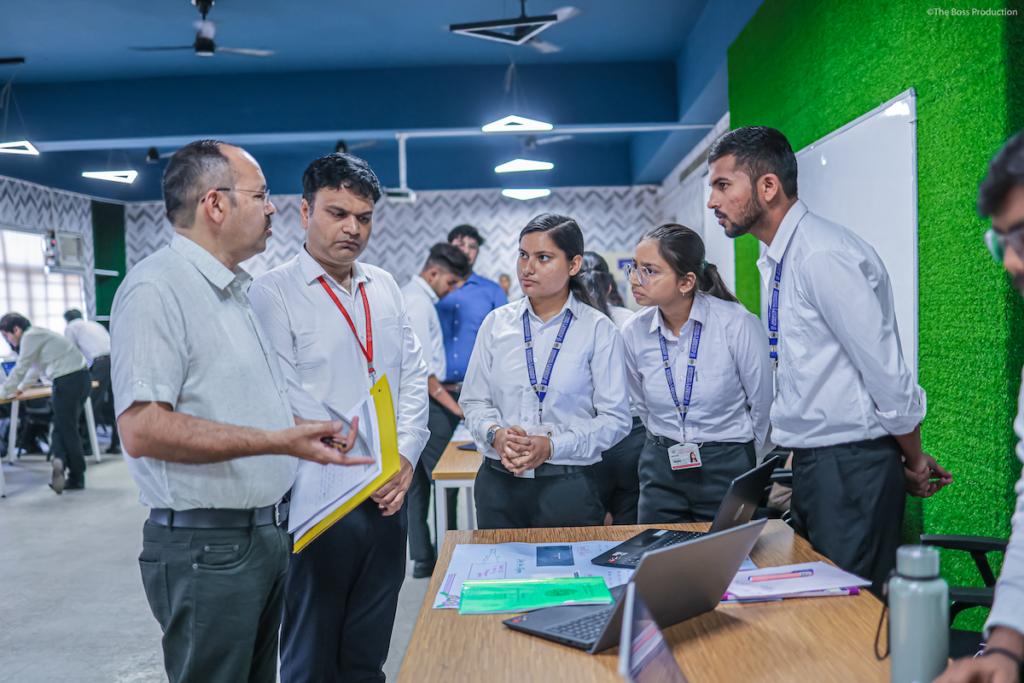
The eligibility criteria for a Bachelor of Technology (B.Tech) in Computer Science and Engineering (CSE) typically include the following:
Educational Qualification
Candidates must have completed 10+2 or equivalent examination from a recognized board with Physics, Chemistry, and Mathematics as compulsory subjects.
Minimum Marks
Most colleges require a minimum of 50% to 60% aggregate marks in the qualifying examination, though this can vary. Some institutions have higher cut-off marks due to competition.
Entrance Exams
Admission to B.Tech CSE programs is often determined by performance in national or state-level B.Tech CSE entrance exams. Common exams include:
- JEE Main (Joint Entrance Examination Main)
- JEE Advanced (for admission to IITs)
- State-specific exams like MHT CET, KCET, WBJEE, etc.
- BITSAT (for admission to BITS Pilani and its other campuses)
Age Limit
Some institutions may have an age limit (usually the candidate should be at least 17 years old as of a certain date in the year of admission).
Residential Criteria
Depending on the state and the institution, there might be specific residential criteria for quota and reservation benefits.
Top Entrance Exams for B Tech CSE
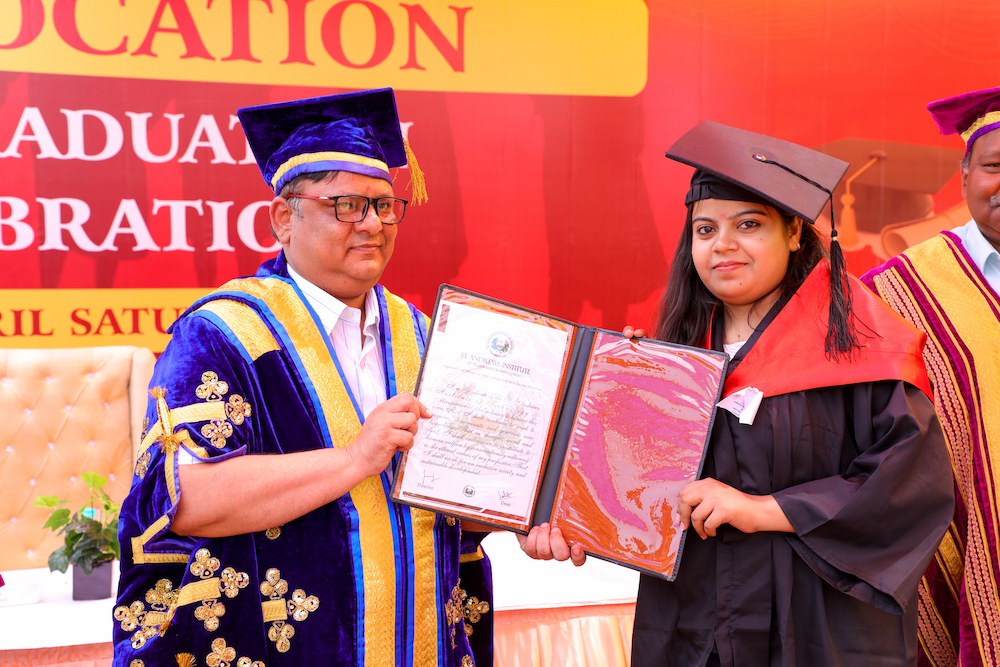
To pursue a B.Tech in Computer Science and Engineering (CSE), students must typically clear entrance exams, reflecting the rigorous admission standards and the CSE full form in the selection process.
Here are some of the top entrance exams for B.Tech CSE in India:
Joint Entrance Examination (JEE) Main
- Conducted by the National Testing Agency (NTA), it is the primary entrance exam for admission to NITs, IIITs, and other centrally funded technical institutions. It is also a qualifying exam for JEE Advanced.
Joint Entrance Examination (JEE) Advanced
- Conducted by one of the IITs on a rotational basis, it is the entrance exam for admission to the Indian Institutes of Technology (IITs).
Birla Institute of Technology and Science Admission Test (BITSAT)
- Conducted by BITS Pilani, it is the entrance exam for admission to its campuses in Pilani, Goa, and Hyderabad.
Vellore Institute of Technology Engineering Entrance Exam (VITEEE)
- Conducted by VIT University for admission to its campuses in Vellore, Chennai, Bhopal, and Amaravati.
Amrita Engineering Entrance Examination (AEEE)
- Conducted by Amrita Vishwa Vidyapeetham for admission to its campuses in Amritapuri, Bengaluru, Coimbatore, and Chennai.
Kalinga Institute of Industrial Technology Entrance Examination (KIITEE)
- Conducted by KIIT University for admission to its campus in Bhubaneswar.
ComedK UGET
- Conducted by the Consortium of Medical, Engineering and Dental Colleges of Karnataka for admission to engineering colleges in Karnataka.
West Bengal Joint Entrance Examination (WBJEE)
- Conducted by the West Bengal Joint Entrance Examinations Board for admission to engineering colleges in West Bengal.
Maharashtra Common Entrance Test (MHT CET)
- Conducted by the State Common Entrance Test Cell for admission to engineering colleges in Maharashtra.
Tamil Nadu Engineering Admission (TNEA)
- Conducted by Anna University for admission to engineering colleges in Tamil Nadu. It is based on the candidate’s performance in the 10+2 examination.
Uttar Pradesh State Entrance Exam (UPSEE)
- Conducted by Dr. A.P.J. Abdul Kalam Technical University for admission to engineering colleges in Uttar Pradesh.
Telangana State Engineering, Agriculture and Medical Common Entrance Test (TS EAMCET)
- Conducted by Jawaharlal Nehru Technological University, Hyderabad, for admission to engineering colleges in Telangana.
Andhra Pradesh Engineering, Agriculture and Medical Common Entrance Test (AP EAMCET)
- Conducted by Jawaharlal Nehru Technological University, Kakinada, for admission to engineering colleges in Andhra Pradesh.
Syllabus and Subjects for B.Tech CSE
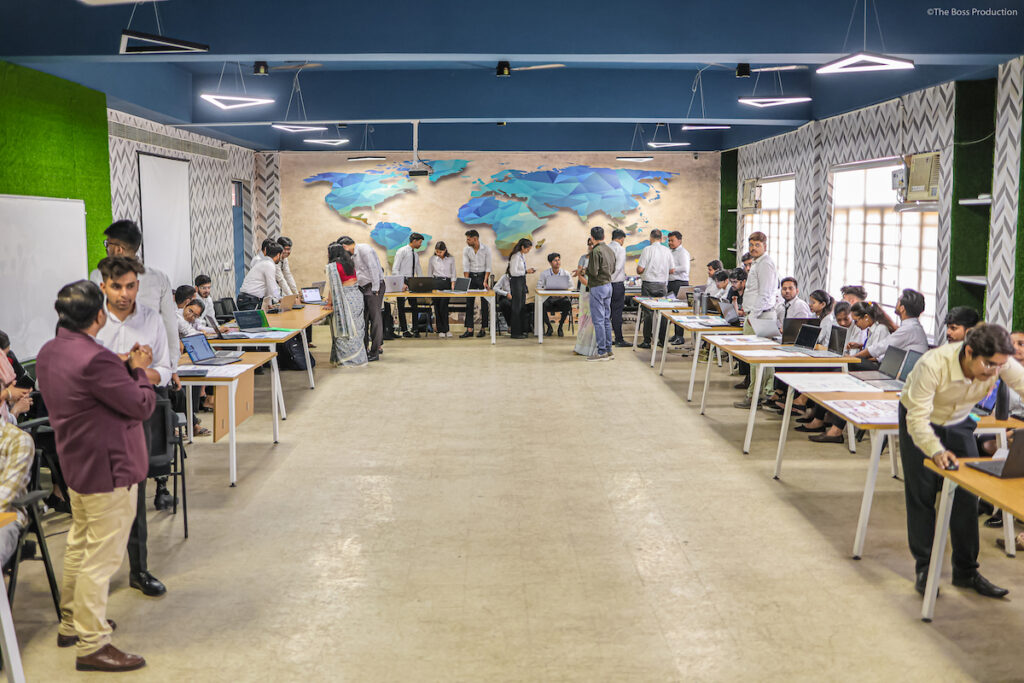
The semester-wise syllabus for a Bachelor of Technology (B.Tech) in Computer Science and Engineering (CSE) is typically organized into a structured distribution of subjects across eight semesters (four years), reflecting the CSE full form in its educational layout.
The syllabus may vary slightly between institutions, but the following outline provides a typical framework:
Semester 1
Mathematics I: Differential Calculus and Linear Algebra.
Engineering Physics: Fundamental concepts in Mechanics and Waves.
Engineering Chemistry: Organic, Inorganic, and Physical Chemistry relevant to engineering applications.
English for Communication: Basics of technical communication and professional writing.
Fundamentals of Computing: Introduction to computer systems and programming fundamentals using languages like C or Python.
Engineering Graphics: Basic engineering drawing and CAD tools.
Environmental Studies: Introduction to environmental science and sustainability.
Semester 2
Mathematics II: Integral Calculus and Differential Equations.
Engineering Mechanics: Statics, Dynamics, and Material Strength.
Object Oriented Programming: Advanced programming concepts using Java or C++.
Data Structures: Introduction to data organization using arrays, stacks, queues, linked lists, and trees.
Digital Electronics and Logic Design: Basics of digital circuits and microprocessors.
Communication Skills: Advanced communication and presentation skills.
Semester 3
Discrete Mathematics: Combinatorics, Graph Theory, and Logic.
Algorithms: Design and analysis of algorithms, including searching and sorting techniques.
Computer Organization and Architecture: Detailed study of computer internals, memory management, and architecture.
Database Management Systems: Introduction to relational databases, SQL, and database design.
Operating Systems: Concepts of OS, processes, threads, and memory management.
Semester 4
Mathematics III: Probability, Statistics, and Numerical Methods.
Theory of Computation: Automata theory, formal languages, and computability.
Computer Networks: Basics of networking, protocols, and network security.
Software Engineering: Software development models, requirements engineering, and testing methodologies.
Elective I: Students can choose from various electives like Web Technologies, Embedded Systems, etc.
Semester 5
Compiler Design: Techniques in parsing, syntax analysis, and compiler optimizations.
Artificial Intelligence: Basics of AI, machine learning algorithms, and neural networks.
Microprocessors and Microcontrollers: Detailed study of microprocessor architecture and programming.
Computer Graphics: Introduction to graphic systems, 3D modeling, and rendering techniques.
Elective II: Advanced topics like Cloud Computing, IoT, etc.
Semester 6
Internet Technologies: Web development, client-server architecture, and dynamic web content.
Data Communication and Networking: Advanced networking concepts, LAN/WAN, and network administration.
Operating Systems Design: Advanced concepts in OS design and kernel architecture.
Elective III: Options might include Blockchain Technology, Data Analytics, etc.
Project I: Preliminary project work focused on practical applications of learned concepts.
Semester 7
Machine Learning: Techniques and applications in machine learning and data science.
Cyber Security: Fundamentals of information security, cryptography, and network security.
Distributed Systems: Concepts of distributed computing, algorithms, and systems.
Elective IV: Topics like Robotics, Quantum Computing, or Advanced Databases.
Project II: Continuation or initiation of a new detailed project.
Semester 8
Project III: Completion of the capstone project, often involving research or industry collaboration.
Elective V & VI: Advanced courses tailored to emerging technologies and student interests.
Professional Ethics and Human Values: Course on ethical issues in engineering and professional practices.
Career Scope and Job Opportunities after BTech CSE

Upon completing a Bachelor of Technology (B.Tech) in Computer Science and Engineering (CSE), graduates are presented with a vast range of career opportunities across various sectors, underscoring the CSE full form and its relevance. The demand for skilled professionals in computer science remains high, driven by rapid technological advancements and the integration of technology into nearly every facet of modern life.
Here’s a detailed overview of the career scope and job opportunities available to B.Tech CSE graduates:
1. Software Development
- Software Engineer: Develop, test, and maintain software applications for various industries.
- Systems Developer: Design and develop operating systems, network systems, and other foundational software.
- Web Developer: Build and maintain websites and web applications.
- Mobile App Developer: Specialize in creating applications for mobile devices on platforms like iOS and Android.
2. Information Technology (IT) & Systems Management
- IT Consultant: Advise businesses on how to use IT systems and infrastructure to meet their goals.
- Systems Analyst: Analyze and improve IT systems to increase efficiency and functionality.
- Network Engineer: Design, set up, and maintain networks.
- Database Administrator: Manage and maintain database systems, ensuring data integrity, security, and performance.
3. Data Science and Analytics
- Scientist: Use statistical methods to generate insights from large data sets to inform business decisions.
- Analyst: Analyze data to help companies better understand their customers, predict trends, and make strategic decisions.
- Machine Learning Engineer: Design and develop machine learning models to automate predictive models.
4. Cybersecurity
- Security Analyst: Protect systems against cyber threats, vulnerabilities, and attacks.
- Ethical Hacker: Employ penetration testing to help organizations strengthen their security.
- Cybersecurity Consultant: Provide expert advice and solutions for maintaining secure systems.
5. Artificial Intelligence and Robotics
- AI Research Scientist: Develop new methods and technologies in artificial intelligence.
- Robotics Engineer: Design and create robots and robotic systems.
- Automation Engineer: Develop systems and software to automate industrial and business processes.
6. Cloud Computing and Networking
- Solutions Architect for Cloud-Based Systems: Designs cloud-based solutions and architecture.
- Service Developer for Cloud Platforms: Develops services and applications that operate on cloud platforms.
- Network Administrator: Manage and maintain network infrastructure, ensuring reliable network performance.
7. Game Design and Development
- Developer: Design, program, and test video games.
- Designer: Conceptualize and plan game narratives, characters, and mechanics.
- Animation and Simulation Specialist: Create animations and simulations for various applications, including games and virtual reality.
8. Academia and Research
- Researcher: Conduct research in various computer science domains in industrial or academic settings.
- Academician: Teach at colleges and universities, and guide the next generation of engineers.
9. Freelancing and Entrepreneurship
- Freelance Developer/Consultant: Offer services on a project basis to various clients.
- Startup Founder: Launch your own tech startup, potentially in innovative fields like fintech, edtech, or health tech.
10. Interdisciplinary Opportunities
- Bioinformatics Specialist: Combine computer science with biology to analyze and interpret biological data.
- Financial Technologist: Develop technologies for banking and finance services.
Top Recruiters for BTech CSE Graduates
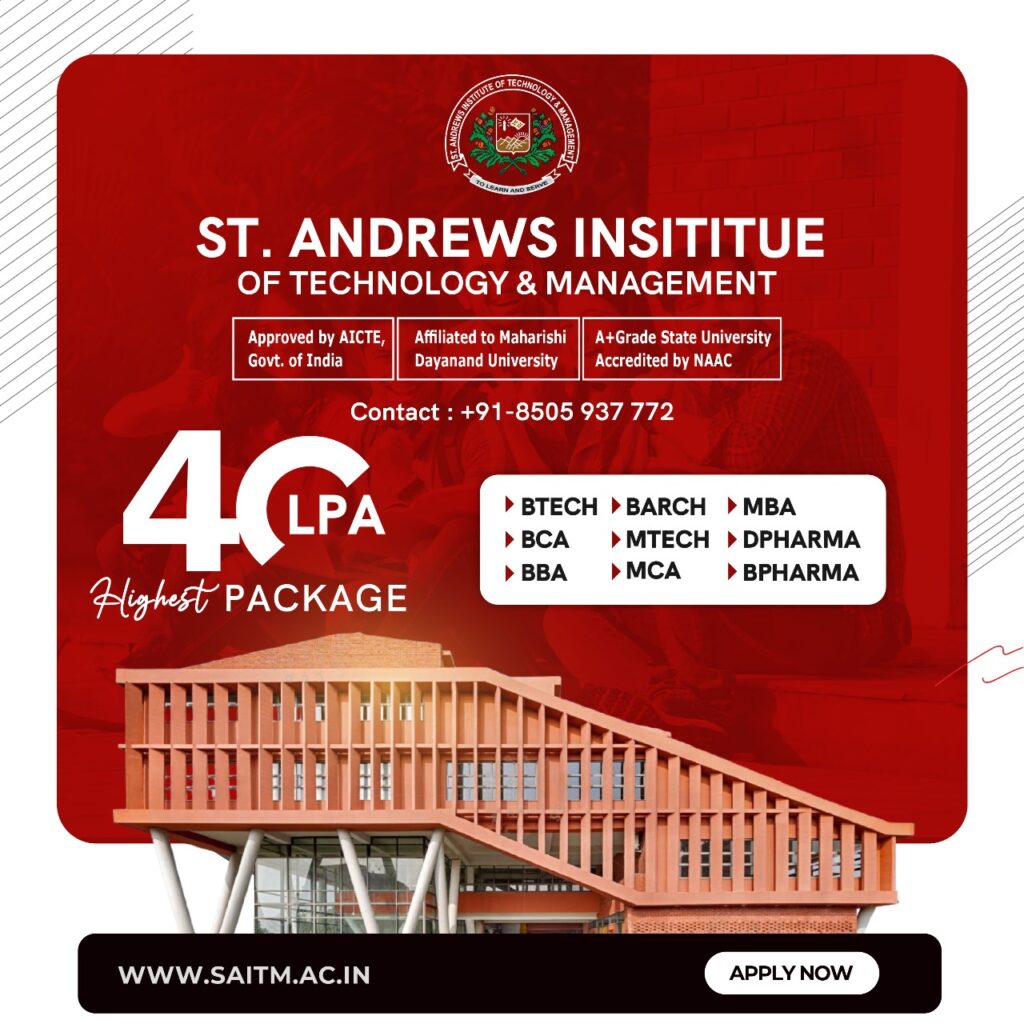
Graduates holding a Bachelor of Technology (B.Tech) in Computer Science and Engineering (CSE) are in high demand by top-tier companies across multiple industries, recognizing the CSE full form and the crucial role of skilled tech professionals in driving innovation and sustaining competitive advantages.
Here are some of the top recruiters that actively seek B.Tech CSE graduates:
Technology Companies
Google: One of the most desirable employers for tech graduates, known for its innovative projects in search, advertising, and more.
Microsoft: Offers roles in software development, system engineering, and cloud services.
Apple: Known for its cutting-edge products and services, hiring for roles in software and hardware engineering.
Amazon: Recruits for various positions in cloud computing, e-commerce technology solutions, and AI.
Facebook (Meta): Offers opportunities in areas like software development, AR/VR technologies, and AI.
IBM: Hires for positions in cloud computing, AI, blockchain, and more.
Oracle: Known for its focus on databases, cloud solutions, and enterprise software solutions.
Cisco: Specializes in networking and communications technology, offering roles in network engineering and cybersecurity.
IT and Consulting Firms
Accenture: Provides consulting services across various technologies and hires extensively for IT solutions.
Tata Consultancy Services (TCS): One of the largest IT services companies globally, offering a myriad of roles in technology and consulting.
Infosys: A major player in the consulting and IT services sector in India and globally.
Cognizant: Offers IT services including digital, technology, consulting, and operations services.
Wipro: Engages in information technology, consulting, and business process services.
Capgemini: French multinational that hires for IT consulting and services.
Startups and Emerging Tech Companies
Byju’s: A leader in educational technology in India.
Ola: An innovator in mobility and transportation services.
Swiggy: A major player in the food delivery service sector.
Zomato: Also a leader in food delivery, with growing tech needs.
Flipkart: An e-commerce giant with a wide range of tech roles.
Paytm: A leader in digital payments and financial services.
Hardware and Electronics Companies
Intel: Develops technologies that power the cloud and an increasingly smart, connected world.
Qualcomm: Specializes in semiconductor and telecommunications equipment.
Samsung Electronics: Offers roles in product development, R&D, and software engineering.
Financial and Fintech Companies
Goldman Sachs: Offers roles in fintech innovations, data science, and financial analytics.
JPMorgan Chase: Hires for technology roles in finance and banking systems.
Visa: Recruits for roles focusing on secure digital payments and innovations.
Aerospace and Defense
Boeing: Offers roles in simulation, cybersecurity, and software development for aerospace.
Lockheed Martin: Provides positions in software engineering, simulation, and systems integration.
Other Notable Recruiters
Deloitte: Provides audit, consulting, tax, and advisory services, with a growing need for tech solutions.
Ernst & Young (EY): Known for consulting and advisory roles, increasingly tech-focused.
Computer Systems and Technology

Computer systems are fundamental to Computer Science and Engineering (CSE), serving as the backbone of both the educational and professional aspects of the field, and highlighting the CSE full form in its core operations.
Here’s a breakdown of why computer systems are so essential in CSE:
1. Foundation of Computing Knowledge
Understanding Hardware and Software Interaction: CSE students must understand how hardware and software interact to perform tasks efficiently. This includes how processors manage instructions, how operating systems handle resource allocation, and how hardware devices communicate.
System Architecture: Knowledge of computer architecture, including the central processing unit (CPU), memory hierarchy, and I/O systems, is fundamental. This helps in optimizing software performance and in designing systems that better leverage hardware capabilities.
2. Development of Practical Skills
Programming: Computer systems are essential for software developers in developing and testing software. This includes everything from simple programs to complex operating systems or software applications.
Simulation and Modeling: Complex algorithms and systems, including networks and databases, are often modeled and simulated on computer systems before they are built or deployed.
Hardware-Software Co-design: Designing optimal systems often requires understanding both the software application and the underlying hardware. This is particularly important in areas like embedded systems, where the software closely interacts with hardware.
3. Innovation and Research
Emerging Technologies: Advanced computer systems are crucial for research in emerging fields like artificial intelligence, machine learning, and data science. These systems provide the computational power needed for processing large datasets and running complex algorithms.
High-Performance Computing (HPC): Many scientific and engineering problems require HPC, which involves powerful computer systems designed to handle and analyze massive amounts of data at high speeds.
Quantum Computing: As a cutting-edge area of research, quantum computing relies on a deep understanding of computer systems at both the theoretical and practical levels.
4. Real-World Applications
Information Systems: Every major industry today relies on computer systems to manage data, from financial institutions managing transactions to healthcare providers storing patient records.
Internet of Things (IoT): IoT devices collect vast amounts of data that need to be processed, often in real-time, by computer systems to perform actions and make decisions.
Cybersecurity: Protecting information systems from cyber threats requires a robust understanding of computer systems, including network setups, software vulnerabilities, and encryption technologies.
5. Critical Thinking and Problem-Solving
Algorithm Design: Effective solutions to computing problems require algorithms that are not only correct but also efficient. This efficiency is deeply tied to how well the algorithms leverage the underlying computer systems.
System Optimization: Whether optimizing an application for speed or efficiency, or ensuring robust security, a deep understanding of the computer system’s operation is necessary.
6. Educational Tools
Software Tools: Learning to use various software development tools, simulation programs, and design tools effectively requires a solid foundation in how computer systems work.
Lab and Practical Work: Much of the hands-on learning in CSE courses occurs through practical lab work, which involves direct interaction with computer systems to reinforce theoretical concepts.
Skills Required for BTech Computer Science Engineering
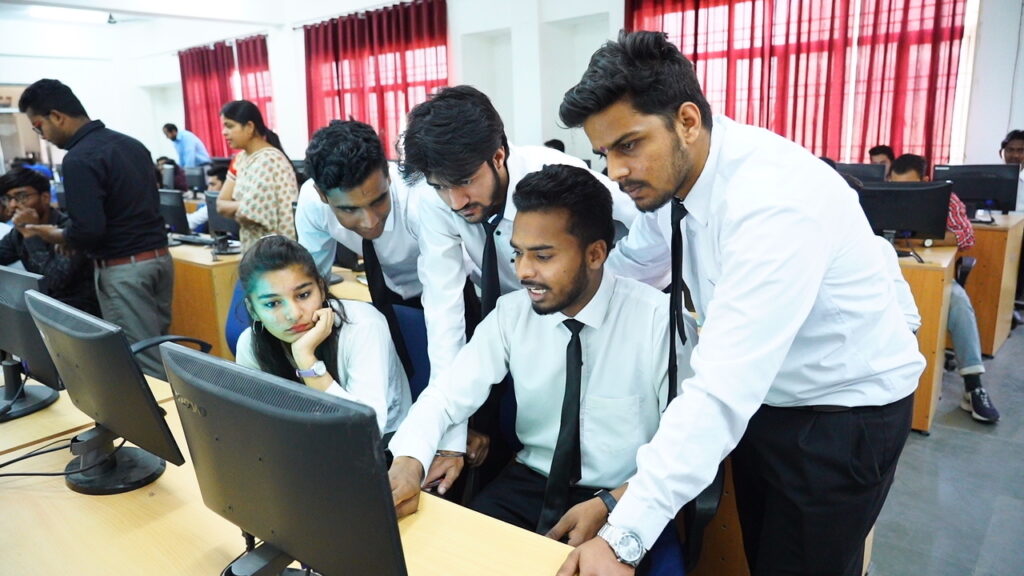
For a Bachelor of Technology (B.Tech) in Computer Science and Engineering (CSE), acquiring a blend of technical and soft skills is crucial for success, both during the academic program and in professional settings, reflecting the CSE full form in its comprehensive skill set requirements.
Here’s a detailed breakdown of the key skills required:
Technical Skills
Programming Languages: Proficiency in programming is fundamental. Languages like Python, Java, C++, and JavaScript are commonly used and highly valued in the field.
Data Structures and Algorithms: Understanding how to effectively manage, store, and process data is critical for solving complex computing problems.
Software Development: Knowledge of the software development lifecycle, including designing, testing, and maintaining software.
Database Management: Skills in SQL and database technologies such as MySQL, Oracle, or MongoDB help in managing data efficiently.
Operating Systems: An understanding of operating systems like Windows, Linux, and UNIX allows for better management of software resources.
Networking: Basic knowledge of network architecture, protocols like TCP/IP, and network security is important, especially for roles involving network operations or security.
Web Development: Skills in both front-end (HTML, CSS, JavaScript) and back-end (Node.js, Django, Ruby on Rails) web development are increasingly necessary.
Cloud Computing: Familiarity with cloud services such as AWS, Azure, or Google Cloud is beneficial as more companies move to cloud-based solutions.
Machine Learning and Artificial Intelligence: Basic knowledge of AI and machine learning frameworks like TensorFlow or PyTorch can open doors to cutting-edge projects and industries.
Cybersecurity: Understanding of security principles, cybersecurity defenses, and vulnerabilities to protect data and systems.
Soft Skills
Problem-Solving: Ability to think critically and solve complex problems is crucial for programming and system design.
Analytical Thinking: The ability to analyze large amounts of information and data quickly and effectively.
Creativity and Innovation: Coming up with new ideas and innovative solutions is highly valued, especially in product development and system improvements.
Teamwork: Most projects require collaboration with other engineers, requiring good interpersonal and communication skills.
Time Management: Ability to manage time efficiently and prioritize tasks to meet deadlines in fast-paced environments.
Adaptability: Tech fields evolve rapidly; being able to learn new technologies and adapt to changing environments is crucial.
Attention to Detail: Errors can be costly in software development. Precision and attention to detail are therefore essential.
Communication: Both verbal and written communication skills are important for explaining complex concepts to non-experts, writing documentation, and collaboration.
Benefits of Studying CSE
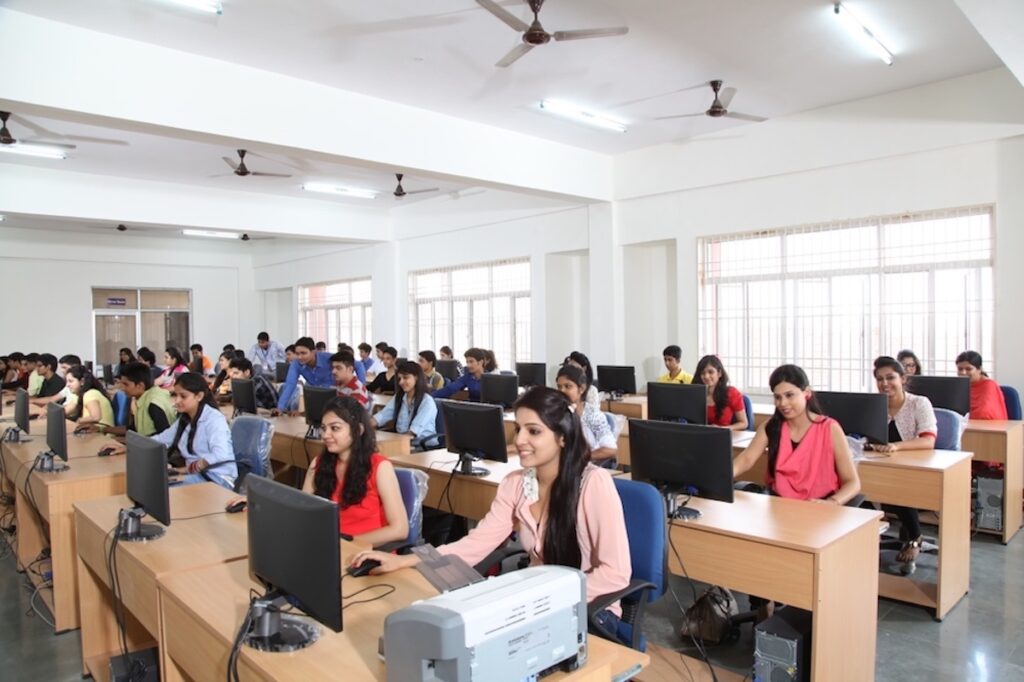
Pursuing a degree in Computer Science and Engineering (CSE) offers numerous advantages, highlighting the CSE full form in its global appeal and making it one of the most sought-after degrees by students worldwide.
Here’s an overview of the primary advantages:
1. High Demand for Skills
Broad Career Opportunities: CSE graduates have diverse career options in technology, finance, healthcare, manufacturing, government, and more. The skills learned are applicable in numerous sectors that rely on digital technologies.
Job Security: Due to the critical role of technology in modern business, jobs in computer science tend to be stable and in demand globally. Even in economic downturns, tech roles are among the last to be affected.
2. Lucrative Salaries
Competitive Pay: Careers in computer science are among the highest paying in the world. Software engineers, data scientists, and IT managers often command high salaries even at entry-level positions due to the value they bring to businesses.
3. Innovation and Creativity
Cutting-edge Work: CSE students often work on the forefront of technological advances, from artificial intelligence and machine learning to quantum computing and blockchain.
Problem Solving: The degree emphasizes creative problem-solving skills, allowing graduates to devise innovative solutions to complex challenges, enhancing both their personal and professional growth.
4. Flexibility and Mobility
Remote Work Opportunities: Many tech jobs offer the flexibility to work remotely, providing a significant advantage in work-life balance.
Global Opportunities: With a universally applicable skill set, CSE graduates can find employment opportunities worldwide, not limited by geographical constraints.
5. Interdisciplinary Applications
Cross-sector Impact: Skills learned in CSE are applicable in various fields, allowing professionals to work on interdisciplinary teams and projects, such as in bioinformatics, fintech, or cyber-physical systems.
Versatility: The foundational knowledge in systems thinking, programming, and analysis enables graduates to adapt to various roles outside traditional tech jobs, including managerial or strategic positions.
6. Entrepreneurial Potential
Startups and Innovation: The tech industry is known for its startups and entrepreneurial spirit. CSE education equips graduates with the skills to start their own tech companies or develop new products and services.
Venture Capital Interest: Tech startups often attract significant interest from investors, providing additional opportunities for ambitious innovators.
7. Continuous Learning Environment
Ever-evolving Field: Technology changes rapidly, and staying engaged in this field means a lifelong learning journey, which can be intellectually stimulating and rewarding.
Professional Development: There are endless opportunities for professional growth through certifications, workshops, and further education in emerging tech areas.
8. Social Impact
Solving Real-World Problems: Technology has the power to address major global challenges such as health, education, and the environment. CSE professionals play a crucial role in developing solutions that improve lives.
Accessibility and Efficiency: By creating more efficient systems and accessible technologies, CSE graduates contribute to making everyday tasks easier and improving the quality of life for people around the world.
9. Academic Opportunities
Research: Academic pathways are robust, with opportunities for conducting groundbreaking research in various areas of computer science and contributing to the academic community through teaching.
Top Government Colleges for BTech CSE

India features several leading government colleges known for their exceptional Computer Science Engineering (CSE) programs, embodying the CSE full form in their educational approach. These institutions are celebrated for their rigorous curriculum, extensive research opportunities, and robust industry connections.
Here’s a list of some of the top government BTech CSE colleges in India:
1. Indian Institutes of Technology (IITs)
- IIT Bombay, IIT Delhi, IIT Madras, IIT Kanpur and IIT Kharagpur :-These are considered the premier engineering institutes in India and offer outstanding programs in CSE. Admission is through the Joint Entrance Examination (JEE) Advanced.
2. National Institutes of Technology (NITs)
- NIT Trichy, NIT Surathkal, NIT Warangal and NIT Calicut :-NITs are among the best engineering colleges after IITs and are known for their strong undergraduate programs. Admission to NITs is based on JEE Main ranks.
3. Indian Institute of Information Technology (IIITs)
- IIIT Hyderabad, IIIT Allahabad and IIIT Bangalore :- IIITs specialize in information technology and computer science, and their CSE programs are highly competitive and research-oriented.
4. Other Central Government Colleges
Delhi Technological University (DTU)
College of Engineering, Pune (COEP)
Jadavpur University, Kolkata These institutes have excellent CSE programs with strong faculty, good placement records, and robust infrastructure.
5. Indian School of Mines (ISM), Dhanbad
Now known as IIT Dhanbad, it offers high-quality education and research opportunities in engineering and technology fields, including CSE.
6. University Departments
Anna University, Chennai These universities offer respected CSE programs with strong academic frameworks and industry linkages.
7. Institute of Technology, Banaras Hindu University (IIT BHU)
Located in Varanasi, IIT BHU is one of the oldest engineering institutes in the country with a prestigious CSE program.
Top Private Colleges for BTech CSE
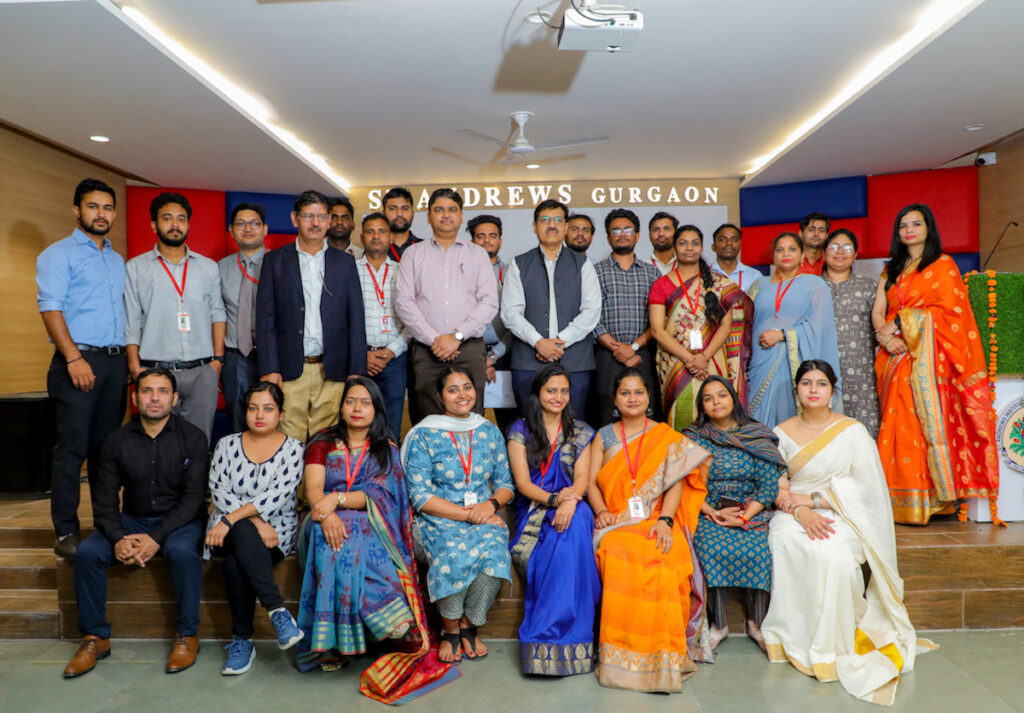
India is home to numerous prestigious private colleges that offer top-notch Bachelor of Technology (B.Tech) programs in Computer Science and Engineering (CSE), reflecting the CSE full form in their academic offerings. These institutions are renowned for their advanced curriculum, modern facilities, and strong industry connections, often leading to high placement rates.
Here’s a list of some of the top private colleges for B.Tech CSE in India:
BITS Pilani (Birla Institute of Technology and Science, Pilani)
Known for its rigorous academic programs and excellent campus facilities, BITS Pilani is one of the top private engineering colleges in India. It conducts its own entrance test, BITSAT, for admissions.
Vellore Institute of Technology (VIT), Vellore
VIT is popular for its multicultural ambiance and high placement records, particularly in CSE. It conducts the Vellore Institute of Technology Engineering Entrance Examination (VITEEE) for admissions.
Amrita Vishwa Vidyapeetham, Coimbatore
Known for its strong emphasis on research and sustainable development, Amrita School of Engineering offers an excellent program in CSE. Admissions are based on the rank scored in its entrance exam, AEEE, or JEE Mains scores.
Thapar Institute of Engineering & Technology, Patiala
Known for its high academic standards and strong placement statistics, Thapar Institute particularly excels in the CSE department.
Dhirubhai Ambani Institute of Information and Communication Technology (DA-IICT), Gandhinagar
Focused primarily on information and communication technology, DA-IICT provides a specialized and research-oriented curriculum in CSE.
BMS College of Engineering, Bangalore
One of the oldest engineering colleges in Karnataka, known for its strong academic ethos and excellent placements in CSE.
R.V. College of Engineering, Bangalore
RVCE is highly regarded for its academic rigor and comprehensive CSE program, which attracts top companies for campus placements.
PES University, Bangalore
Offers a dynamic CSE program with opportunities for innovation and entrepreneurship. Admission is through PES Scholastic Aptitude Test (PESSAT) or Karnataka CET.
Salary Trends for B Tech CSE Professionals
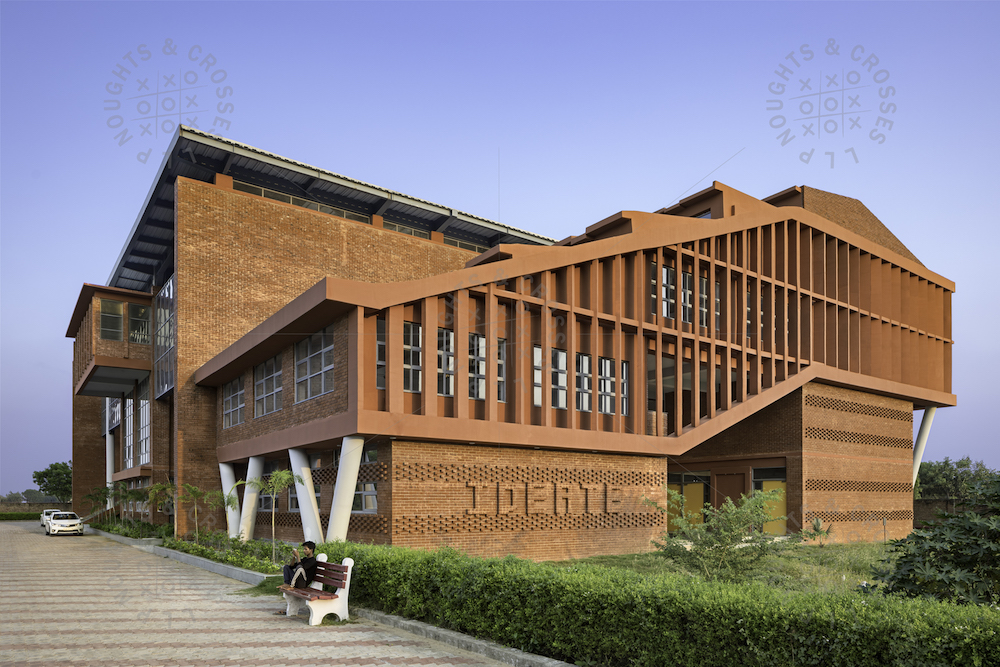
Entry-Level: Fresh graduates with a B.Tech in Computer Science Engineering can expect starting salaries ranging from ₹3.5 lakh to ₹10 lakh per annum, depending on the company and location.
Mid-Level: With 3-5 years of experience, professionals can earn between ₹8 lakh and ₹20 lakh per annum, with salaries varying based on specialization and expertise.
Senior-Level: Experienced professionals with over 10 years of experience can command salaries from ₹15 lakh to ₹30 lakh per annum or higher, especially in leadership roles or niche fields.
Top Tech Companies: Leading technology firms and multinational companies often offer higher compensation packages, including bonuses and stock options.
Specializations in B Tech CSE

A B.Tech in Computer Science and Engineering (CSE) provides a variety of specializations to accommodate the diverse interests and career aspirations of students, reflecting the CSE full form in its breadth of offerings.
Here are some of the popular specializations in B.Tech CSE:
Artificial Intelligence and Machine Learning (AI & ML)
- Focuses on developing algorithms and systems that enable machines to learn and make decisions.
Data Science and Big Data Analytics
- Involves the study of techniques and tools for analyzing large sets of data to extract meaningful insights.
Cyber Security
- Covers the principles and practices of protecting computer systems and networks from cyber threats and attacks.
Internet of Things (IoT)
- Focuses on the design and implementation of interconnected devices that communicate and exchange data over the internet.
Software Engineering
- Emphasizes the application of engineering principles to software development, including design, testing, and maintenance.
Cloud Computing
- Involves the study of distributed computing and the use of cloud platforms for storage, processing, and deployment of applications.
Blockchain Technology
- Covers the fundamentals of blockchain, distributed ledger technologies, and their applications in various industries.
Robotics and Automation
- Focuses on the design, construction, and operation of robots and automated systems.
Human-Computer Interaction (HCI)
- Studies the design and use of computer technology, focusing on the interfaces between people and computers.
Mobile Application Development
- Involves the creation of applications for mobile devices, including smartphones and tablets.
Gaming and Graphics
- Focuses on the development of video games and computer graphics, including animation and visual effects.
Network Engineering
- Covers the design, implementation, and management of computer networks and communication systems.
Bioinformatics
- Combines computer science, biology, and information technology to analyze and interpret biological data.
Embedded Systems
- Involves the study of computing systems embedded within electronic devices and their real-time operating environments.
FAQs
What is the CSE salary?
The average salary for a Computer Science Engineer (CSE) in India starts from ₹3.5 lakh to ₹10 lakh per annum for entry-level positions, illustrating the CSE full form in its professional valuation. With experience, salaries can rise to ₹15 lakh to ₹30 lakh per annum or more, varying by role, company, and location. Top tech companies and specialized roles typically offer higher compensation.
What is the use of CSE course?
A Computer Science Engineering (CSE) course equips students with the essential knowledge and skills to design, develop, and manage both software and hardware systems, reflecting the CSE full form in its comprehensive curriculum. The key uses of a CSE course include:
- Software Development: Creating applications, operating systems, and software solutions for various industries.
- System Design and Architecture: Designing and managing complex computing systems and networks.
- Data Analysis and Machine Learning: Analyzing large datasets and developing machine learning algorithms for predictive modeling and automation.
- Cybersecurity: Ensuring the security of systems and data against cyber threats and attacks.
- Research and Innovation: Contributing to advancements in technology through research and development.
- Career Opportunities: Providing diverse career paths in IT, finance, healthcare, education, and many other sectors.
What is the work of CSE?
The role of a Computer Science Engineer (CSE), embodying the CSE full form, encompasses designing, developing, and maintaining both software and hardware systems. Their key responsibilities include software development, system design, database management, networking, cybersecurity, and troubleshooting. Additionally, they engage in research and development, project management, user interface design, and the creation of machine learning and AI algorithms. Computer Science Engineers play a crucial role in ensuring the efficient operation and security of computer software and systems across diverse industries.
What is the full form of CSE in government?
In the context of government initiatives, CSE often represents “Common Service Centres,” aligning with the CSE full form in this application. These centres are integral to the Digital India initiative, aimed at delivering e-governance services to the rural and remote areas of India.
What is the BTech CSE course?
A B.Tech in Computer Science Engineering (CSE), a four-year undergraduate program, delves into the study of computer systems, software development, and computational processes. This curriculum, representing the CSE full form, encompasses a range of subjects including programming, data structures, algorithms, computer networks, databases, artificial intelligence, machine learning, and cybersecurity.
Computer Science Engineering students learn to design, develop, and manage software applications and systems. The curriculum combines theoretical knowledge with practical skills through labs, projects, and internships.
Graduates of B.Tech CSE, as Computer Science Engineers, are well-equipped for careers in software development, IT consulting, system architecture, cybersecurity, data analysis, and research. They often pursue roles in leading tech companies or continue their studies in advanced computing fields.
Is BTech cse a good course?
Yes, a B.Tech in Computer Science Engineering (CSE) is a good course for several reasons:
High Demand: There’s a strong demand for skilled computer science professionals in various industries, including IT, finance, healthcare, and more.
Diverse Career Opportunities: Graduates can pursue careers in software development, data science, cybersecurity, system architecture, AI, and research.
Good Salary: CSE graduates often command competitive salaries, with many opportunities for growth.
Innovation and Research: The field offers numerous opportunities for innovation and research, contributing to advancements in technology.
Global Opportunities: CSE skills are in demand worldwide, providing global career prospects.
Who are eligible for BTech cse?
Eligibility criteria for a BTech in Computer Science Engineering (CSE) typically include:
Educational Qualification: Completion of 10+2 (or equivalent) with a focus on science subjects, particularly Physics, Chemistry, and Mathematics.
Minimum Marks: A minimum percentage of marks in the qualifying examination, usually around 50-60%, depending on the institution.
Entrance Exams: Qualifying scores in relevant entrance exams such as JEE Main, JEE Advanced, state-level entrance exams, or specific university entrance tests.
Age Limit: Some institutions may have age criteria, generally requiring candidates to be within a specific age range at the time of admission.
What is Software Engineering?
Software Engineering involves the systematic use of engineering principles to design, develop, test, and maintain software, embodying the CSE full form in its commitment to structured development. This discipline utilizes methodologies, processes, and tools to ensure the quality, reliability, and efficiency of software. Software developers focus on crafting scalable and robust solutions that align with user needs and industry standards.


